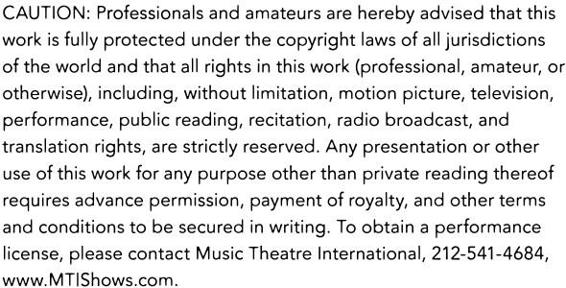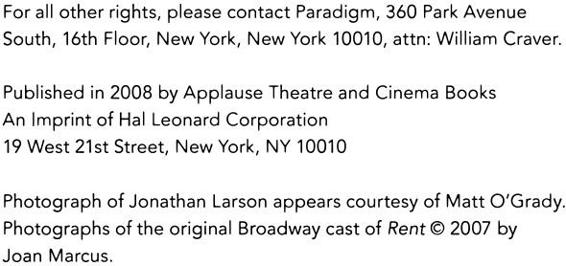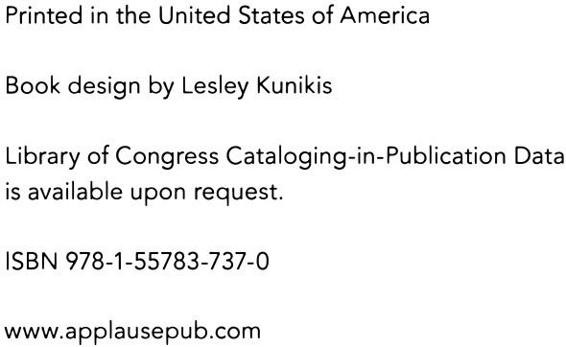Rent: The Complete Book and Lyrics of the Broadway Musical
Read Rent: The Complete Book and Lyrics of the Broadway Musical Online
Authors: Jonathan Larson



RENT
RENT
The Complete Book and Lyrics
of the Broadway Musical
Book, Music, and Lyrics
by Jonathan Larson






Contents
Cast and Credits (Original Broadway Performance) .........................................xv
Musical Numbers .....................................................................xix
Act One ......................................................................................1
Act Two
.................................................................................... 87
Introduction
Rent Is Real
by Victoria Leacock Hoffman
"Rent is about a community celebrating life in the face of death and AIDS at the turn of the century."
-Jonathan Larson
When Jonathan Larson started writing Rent, he was twenty-nine years old. It was 1989 and he was living in a fourth-floor tenement walk-up on the edge of SoHo in downtown Manhattan.
People were dying.
AIDS seemed to be everywhere, and in New York City it was.
Jonathan's living room overlooked a garbage depot. Sitting at his desk, a distressed drafting table, in his sagging director's chair, he would devote almost seven years to creating his rock-musical Rent.
I had first met Jonathan Larson at Adelphi University in 1981, during a rehearsal for the senior-class production of Godspell. He was portraying Jesus and was being crucified. Since the musical was being done with a "circus motif," he was being suspended above the stage by two gymnastic rings. It is hard to sing and act when you are hanging from your arms, and although I would soon discover Jonathan's brilliance, at that moment he was struggling. I was a freshman theatre major and had been assigned to focus lights for the production. But I was focusing on Jonathan. I had heard about the star of the senior show, how he had received a full four-year acting scholarship and that he was also a great composer. And I liked what I saw, his dark tussled hair and long limbs, and his impassioned performance, despite the obvious physical discomfort, was arresting. Just a few months earlier, there had been assassination attempts against Pope John Paul II and President Reagan, and the first anniversary of John Lennon's murder was approaching; the world seemed an uncertain place. As I watched Jonathan sing his heart out, I knew the world was a better place with him in it. I also knew that he'd be my first love, which he was. What I didn't know was that we would become best friends and close collaborators for the next fifteen years.
In 1982, when Jonathan graduated and moved to Manhattan, he intended to be an actor. He had started to go to open casting calls for plays and musicals, but found his leading-man talent was being thwarted by his tall "character actor" looks. He had started a correspondence with Stephen Sondheim when he was in college, and after his first frustrating year in New York, he wrote to his mentor and asked if he thought he should pursue being a composer. Having critiqued some of Jonathan's music, the answer would change his life, for Sondheim told him, "I know a lot fewer starving composers then I do actors." Jonathan took the advice to mean that he was talented enough as a composer to try.
That same year, the Centers for Disease Control and Prevention gave a name to a new illness-AIDS (Acquired Immunodeficiency Syndrome). In New York, in the artistic community, there were whispers of a growing number of young gay men becoming ill and dying of rare cancers. Jonathan and I and our friends, some of whom were gay, started paying attention, but it was like seeing something out of the corner of your eye-we were aware of it, but until it was better defined and we knew what to do about it, we were absorbed in trying to pay our rent and forge our careers. AIDS, like auto accidents and plane crashes, was something you heard about, but only in terms of someone else: someone you didn't know.
Jonathan threw himself into writing musicals that he hoped and believed would save Broadway from itself. He had grown up in Westchester, just north of New York City, where his parents brought him and his sister, Julie, to see West Side Story, Gypsy, Hair, and Jesus Christ Superstar. But he was dismayed at what he now saw as the pandering of Broadway to busloads of lunching blue-haired ladies. The shows he had been raised on had been replaced by pyrotechnic spectacles and whiskery costumes. He believed theatre should be transcendent, with the power to change your life. And he believed he was the man to do it.
To this end, he waited tables at Hamburger Harry's, in the theatre district, where he met and began dating Brenda Daniels, fellow waitperson and modern dancer. She was tall, with short, spiky hair, and had tremendous talent. She was teaching at the Merce Cunningham Studio and was well aware of the threat that was enveloping her community of dancers: HIV, the human immunodeficiency virus, had been identified as the virus that causes AIDS. And it was tearing through the lives of the dance company, like it would in the fashion, nightclub, theatre, and film communities. Rock Hudson, a very handsome matinee idol of Jon's mother's generation, had shocked much of the nation when shortly before he died he disclosed he had AIDS. His ravaged appearance underscored the viciousness of the illness.
Throughout the mid-eighties, as the hole in the ozone layer grew, celebrities were trying to heal the world's ills with the pop songs "Do They Know It's Christmas" and "We Are the World." In New York City, crack cocaine had started to work its way into the lives of the vulnerable, and the homeless population was exploding, with almost 25,000 people living on the streets and in the shelter system. Jonathan, who subscribed to the New York Times no matter how poor he was, absorbed these facts and saw many of them outside his window while living with two roommates, two cats and working his three shifts a week, now at the Moondance Diner. He spent the rest of his time, writing a musical version of George Orwell's 1984 that he'd been unable to secure the rights for, and Superbia, a futuristic allegory about bottom-line mentality in an orbiting studio where everyone lives on and for the camera. Both musicals were set in a world where Big Brother greed and lust for power supersedes the individual's hopes and dreams.
